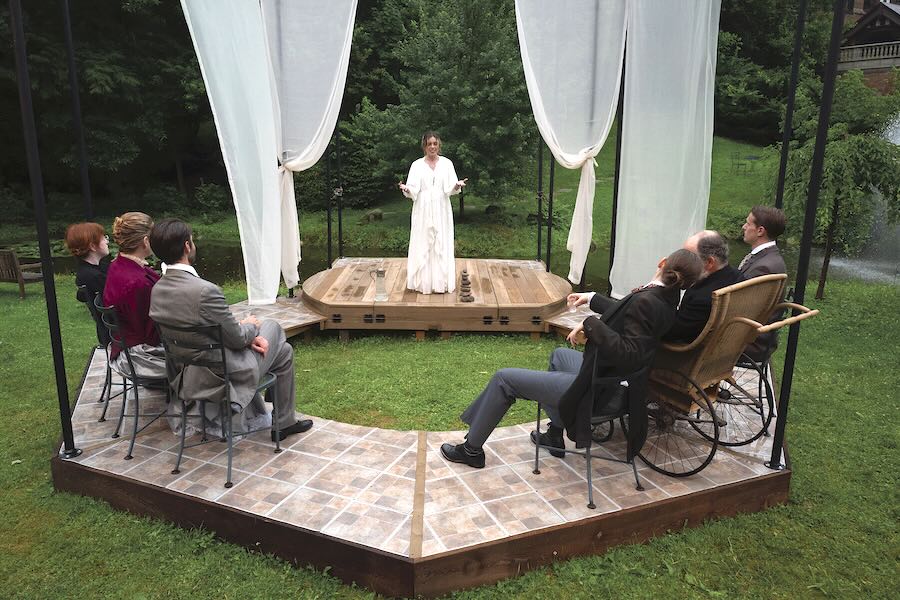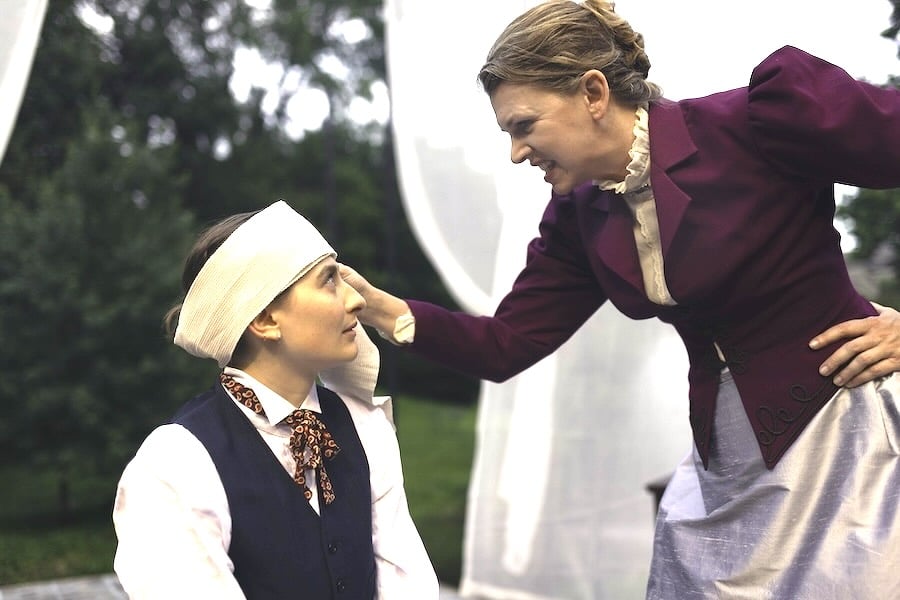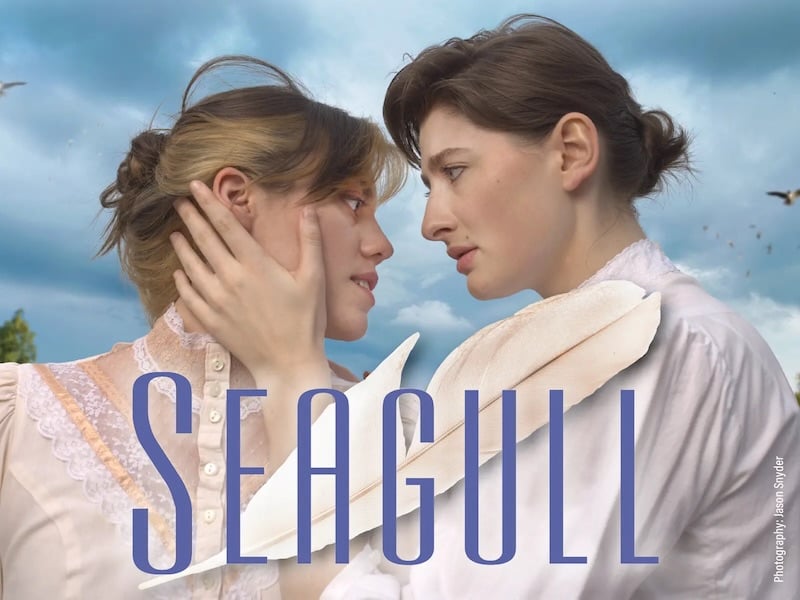Summer is always a great time to hit the road and explore theater companies yet unseen; this year, for the first time, I hit Pittsburgh because word had it that there was a dynamite production of Anton Chekhov’s classic The Seagull (here simply Seagull). The kicker was that it was staged in a temporary open-air theater on the Chatham University campus, which is as picturesque as it gets. The stage, flanked by frequently opened gauze curtains, was backed by a small pond and surrounded by a green meadow, which was exploited by the cast in ways that were truly delightful to see, with parallel “silent” scenes playing out to complement the onstage dialogue.
The production featured a new approach to the central character of Constantine (the brooding, tortured avant-garde artiste), which created a new dynamic among Chekhov’s characters and made the visit all the more worthwhile. Adaptor and Director Joanie Schultz has taken a sprawling, three-plus-hours slog of a play, condensed it to some two hours’ traffic, and, to top it all off, has also unleashed her company of talented actors to explore Chatham’s grounds.

The result is a concise, environmentally vivid rendering of a play that seems set literally in the countryside, complete with all the cicadas, birds, and even rabbits, whose timing for entrances and exits is exquisite, I must say. The sense of place is fully realized, and the energy of the space alone is worth the ticket. Quantum Theatre specializes in staging productions in spaces that are not theaters, using neutral spaces as opportunities for actors to explore new relationships with their audiences and each other.
Anchoring this production, and setting it ablaze with passion, is Phoebe Lloyd’s turn as Constantine; in Schultz’s adaptation, the young, aspiring playwright is a daughter who identifies as male (née Katerina); and although much could be made of the “queering” of this classic character, the brilliance and vulnerability Lloyd brings to the role leaves all academic theorizing in the dust (or, there being a pond here, in the muck). We’re not watching a grad student thesis project brought awkwardly to life; what we see in Lloyd is a human being, struggling with misprized love and the crushing disappointment of having a famous mother — Arkadina, played with fire by Lisa Velten Smith — who only pretends to give a damn.
The dynamic between Smith’s Arkadina and Lloyd’s Constantine is here recast as a variation on the eternal mother-daughter struggle, with moments of loving tenderness turning on a dime to bitter rebuke. The battle between mother and child in this play has never been as vivid as it is here, and in Schultz’s able hands, there is no sense of a play out of kilter. Because of her fidelity to the original script, Schultz’s big change is easily taken in stride, offering us a fresh look at Seagull and reminding many of us what drew us to Chekhov in the first place. The struggle for love, for new art, and for authenticity is real for all of us in the theater, whoever we may be, however we understand ourselves.
Perhaps one of the most pleasant surprises of the evening is Maxine Coltin’s turn as Masha, the local country girl smitten with Constantine. In other productions I’ve seen, her character blends with the woodwork after her opening line (“I’m in mourning for my life”), but Coltin’s presence always adds an element of exquisite irony; her ever-present hip flask illustrates her ennui, her cynicism, complicated, of course, by her undying, unrequited love for Constantine.

Chekhov loves to create romantic merry-go-rounds, in which A loves B, who’s in love with C, who’s in love with Z, who gets no rest (I hope you get the picture). I say this because Coltin’s Masha is also part of one of the most hilarious, unscripted uses of the meadow behind the stage. While a couple of actors under the klieg lights chatter away about something forgettable, in the distance we first see Lloyd’s Constantine jump out from behind a bush, racing furiously stage left — only to be followed a short while later by Coltin’s Masha, whose pursuit is, of course, hopeless. (Keep your eyes peeled, in other words.)
There isn’t a weak link anywhere in the cast; Evan Vines’ Medvedenko, the sad sack school teacher whom Masha reluctantly marries, creates ample sympathy as his attempt to get attention — let alone affection — fails miserably. And as Arkadina’s fun-loving brother, Sorin, Ken Bolden personifies the bon vivant retiree who’d fit in perfectly on that next Viking cruise, his doctor’s sage advice notwithstanding.
Meanwhile as Dorn, the village doctor (who is supremely annoyed by Sorin’s booze and tobacco habits), Daniel Krell gives us a glimpse of that golden boy who always got the girl for years, and whose possible fling with Polina might explain his unusually sympathetic talks with Masha (who maybe possibly was the product of that possible fling? We’ll never tell).
Unlike all the other characters we encounter, Paul Anderson’s turn as Shamraev, the estate’s manager, provides that much-needed reality check. Because for all of Arkadina’s fame and fortune, it is Shamraev who actually controls her comings and goings, because the horses she needs for her trips into town, or to the train station, are needed in the fields where the late summer grain harvest is already in full swing. (As Chekhov, ever the pragmatist, would remind us: no harvest, no money; no money, no estate; no estate, no fancy dresses, and no excuse for putting on airs.) Equally grounded, and wary of the main characters, is Shamraev’s wife Polina, played here with just the right touch of gravitas by Gwendolyn Kelso. And yeah, she’s got eyes for Dorn.
As Chekhov’s alter ego, the writer Trigorin, Brett Mack does a great job of at least pretending not to understand why everyone makes such a fuss about him. He’s Arkadina’s plus-one, for now, and she clearly regards him as a trophy never to be surrendered. Trigorin’s long confessional monologue, where he lays out his almost OCD-like need to write about everything and everyone, is delivered with one eye on his faux modesty, and another eye on gaining the sympathy, and romantic attentions, of Nina, a local girl who aspires to a career on the stage like that of Arkadina. His obsession with young girls is matched by his need to use Nina as fodder for his fiction, and use her he most definitely does.
So now we come to Nina, who in other productions (and in Chekhov’s eyes) is the center of attention: a village girl who grew up on the same lake as Arkadina, smitten with the theater bug. In most productions, she is crafted to be a tragic figure, an Ophelia-like waif who is abused and discarded by Trigorin in her quest for stardom. Here, however, Schultz has decided to give her Nina, played forcefully throughout by Julia Rocha, an entirely different character.
Assertive and ambitious from the beginning, she engages in a consensual kiss with Constantine at the very opening of the play (by contrast, Chekhov has her dodging Constantine’s embrace with a silly question about a tree). Her response to Trigorin’s long lament about his work is met with glances that are more wary and calculating than sympathetic. This is definitely a young woman who can pinpoint that precise quote in that one story, have it engraved in a locket, and use that locket to leave Trigorin helpless. Not a waif in sight.
It makes sense to give Nina more agency, from our modern perspective, and I fully understand why Schultz would want something more out of this part than just the usual pathetic victim. The biggest change comes with her final scene, where Rocha repeats the famous line:
“I am a seagull; no, I am an actress.”
Originally, this line was designed to show a woman who was distracted, desperately trying to keep it together, half-losing her grip on reality. Here, however, Nina’s refusal to show any signs of distress, let alone remorse — not even for the baby, which she bore and lost — creates a very different ending. Nina is on her way to a small provincial theater, and knows she’ll have to put up with advances from the local men (with whom she may have to sleep, in order to pay for the costumes she’ll use onstage). But this Nina is OK with it, and embraces what she has to do, to have a career.
Put it another way; in most productions Nina is a Russian version of Ophelia; in this production, Nina has matured to become a younger version of Arkadina, equally tough on the outside, and equally reluctant to show any vulnerability whatsoever. Smith and Rocha end up mirroring each other in fascinating ways. And it is Constantine’s realization that Nina has a strength of character that he lacks — that she has become his mother — which leads to the play’s climactic scene, after Nina’s final departure, played out by Lloyd in complete silence.

The design team here is stellar; I was immediately struck by the symbolism of Ryan McMasters’ incidental music before the show, cascading notes on a keyboard accompanied by staccato violin, previewing the tensions we’re about to witness. His interludes shift, from one act to the next, mirroring the action in fascinating ways. Costume Designer Damian E. Dominguez finds just the right balance, between the plain workaday wear favored by Shamraev (and also by Trigorin, ever the fake working stiff) and Arkadina’s dazzling dresses, clearly designed to stop the conversation dead in its tracks. His designs for Nina, too, help to tell her story; from demure, to hot on Trigorin’s trail, to maturity, we see exactly where she is and who she thinks she is.
Given this production’s choice of site Chelsea Warren’s task, as scenic designer, was something of a challenge; there needed to be some sort of performance area for the dialogue, and for the opening play-within-a-play, but there also needed to be visual breathing room for the surroundings, which do so much of the “scenic” work from an audience’s perspective. The placement of posts and gauze curtains, easily dropped and raised, creates the illusion that both the stage and the environment are working together. C. Todd Brown’s lighting, meanwhile, apart from the usual stage wash, features some discreetly-lit drum faces lining the pond behind the stage, which — if you look closely — adopt red, beady eyes during the opening sequence.
In the program notes for this production, Joanie Schultz makes clear that this version of Seagull, a labor of love that was years in the making, is designed in part to honor and reflect upon her own personal struggles, which have been intense indeed. What’s fascinating is that she not only identifies with Constantine’s struggles, but she also chooses to find strength in Nina and her insistence on staying with the theater, come what may.
Schultz, whose work has been seen at Baltimore’s Everyman Theatre and Studio Theatre in Washington, DC (where she has also served as an artistic cabinet member), has created a concept for Seagull that is as visceral as it is new. It is a loving variation on Chekhovian themes, and a great way to introduce new audiences to this seemingly stale, dead white guy’s work.
Running Time: Two hours and 15 minutes, including one intermission.
Seagull plays through August 17, 2025, presented by Quantum Theatre performing outdoors on the Chatham University campus in Pittsburgh, Pennsylvania. Ticket prices vary from $35 to $70. For more information, visit quantumtheatre.com/seagull/
Seagull
Based on the play by Anton Chekhov
Adapted and Directed by Joanie Schultz



